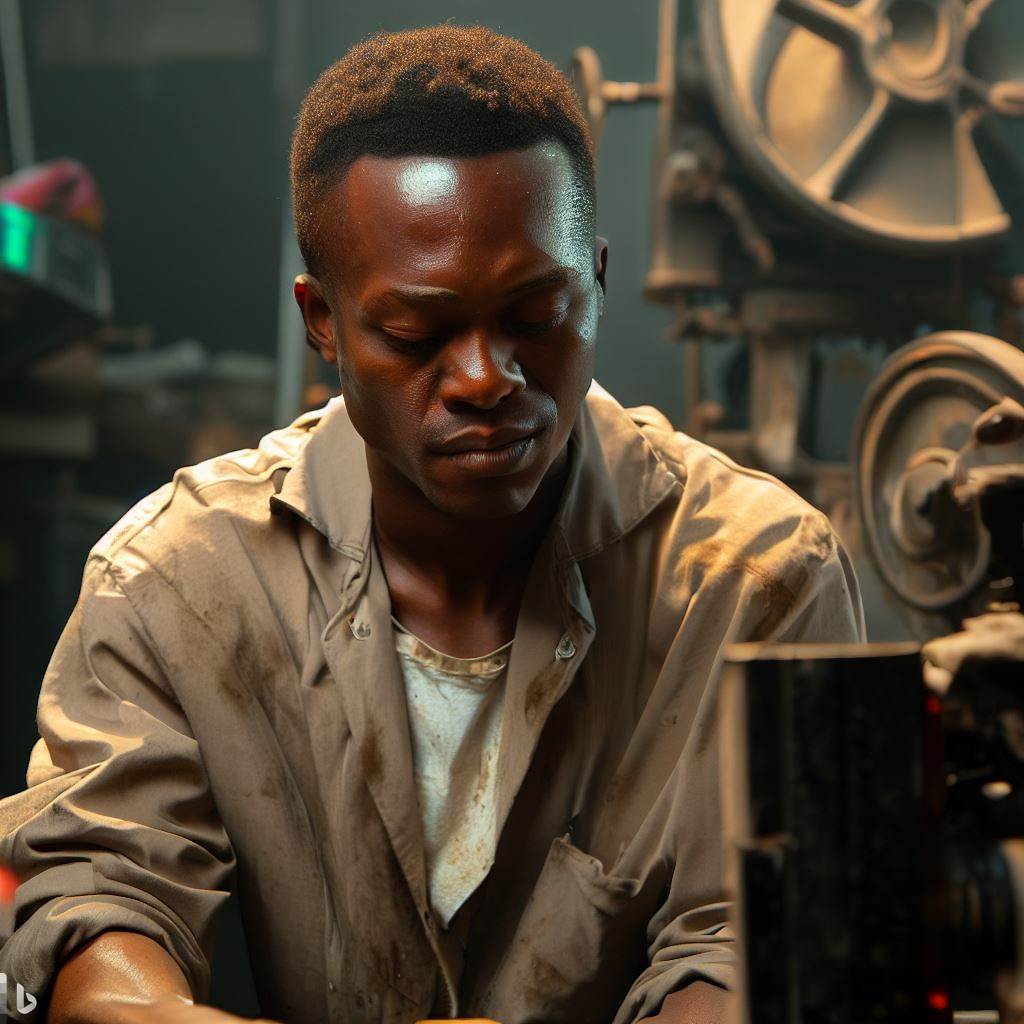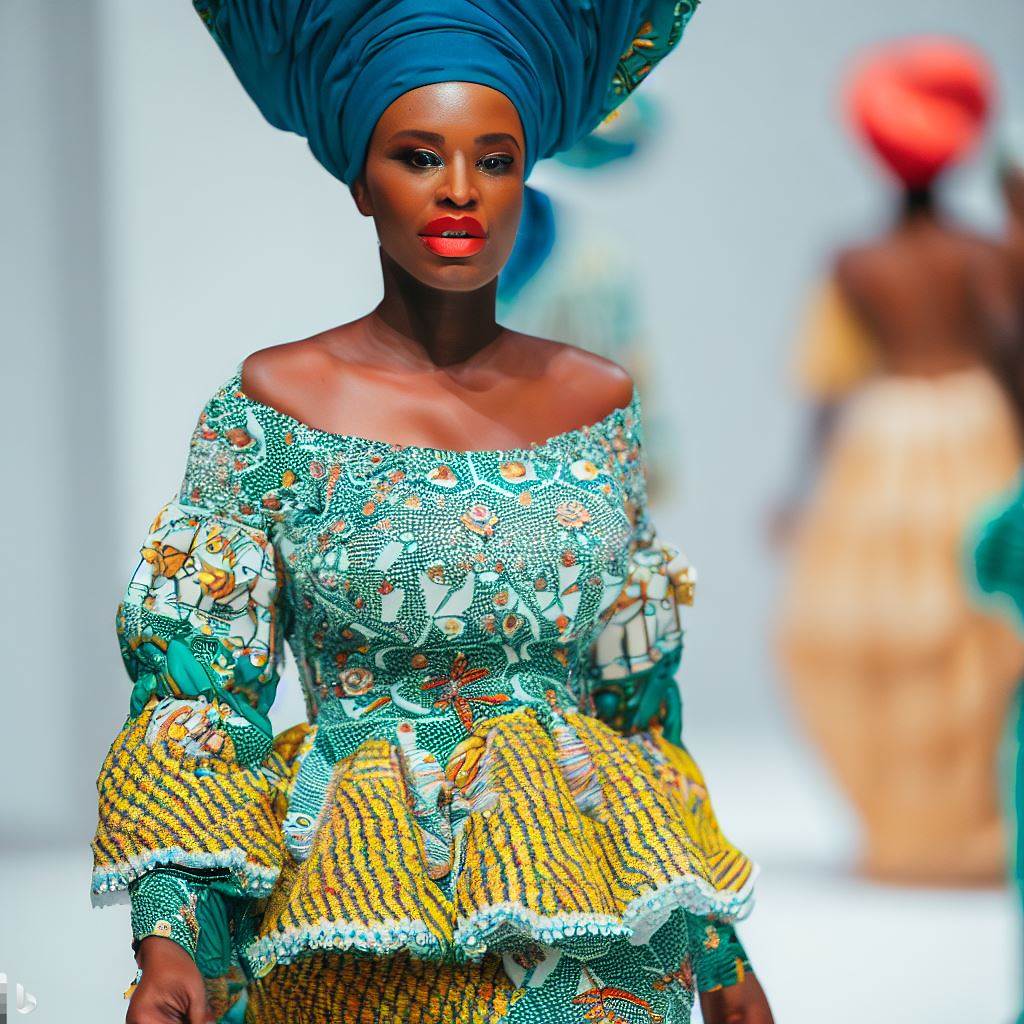Introduction
In the world of film and television, production design plays a crucial role in creating immersive and visually appealing experiences for the audience.
This blog post explores the challenges faced by professionals in the production design industry in Nigeria and highlights the significance of production design in the film and television industry.
A. Definition of production design
Production design refers to the meticulous process of conceptualizing, planning, and executing the physical and visual aspects of a film or television production.
It involves creating sets, costumes, props, and overall aesthetics to enhance storytelling.
B. Importance of production design in film and television industry
Production design is a critical aspect of filmmaking as it sets the visual tone and atmosphere of a story.
It helps establish the time period, location, and mood, thereby enhancing the audience’s engagement and understanding of the narrative.
Moreover, production design has the power to transport viewers to different worlds and create a sense of realism or fantasy.
The production designer’s role is paramount in ensuring that the director’s vision is brought to life by effectively utilizing various elements such as colors, textures, and spatial arrangements.
Their expertise in creating visually captivating environments contributes to the overall quality and success of a production.
Despite its importance, the production design profession in Nigeria faces significant challenges.
These include limited funding and resources, lack of recognition and appreciation for the field, limited access to advanced technology and equipment, and a shortage of skilled professionals.
In the following sections, we will delve into each of these challenges in detail, exploring the impact they have on the production design profession in Nigeria.
By acknowledging and addressing these difficulties, we can strive to uplift and grow the industry in the country.
Lack of Formal Education and Training
One of the major challenges in the production design profession in Nigeria is the lack of formal education and training.
Limited opportunities for education and training in production design in Nigeria
In Nigeria, there are limited opportunities for individuals to receive education and training in production design.
This lack of formal education and training has a direct impact on the quality of production design in the industry.
Without proper education and training, professionals in the field may lack the necessary skills and knowledge to excel in their work.
As a result, the overall quality of production design in Nigeria may suffer.
Need for more specialized courses and workshops
There is a need for more specialized courses and workshops focused specifically on production design.
These specialized courses would provide aspiring production designers with the necessary foundation and skills to succeed in their careers.
By offering more opportunities for education and training, the industry can improve the standard of production design in Nigeria.
Moreover, these specialized courses and workshops would also help to address the specific challenges faced by production designers in Nigeria.
- They can focus on teaching techniques and strategies that are applicable to the Nigerian context.
- For example, courses can explore ways to work with limited budgets and resources while still achieving high-quality designs.
- Additionally, workshops can provide hands-on experience and practical knowledge that cannot be obtained through formal education alone.
By equipping production designers with the necessary skills and knowledge, the industry in Nigeria can overcome the challenges it faces.
Furthermore, specialized courses and workshops can also help to enhance collaboration and networking among production designers in Nigeria.
These opportunities provide a platform for professionals to share their experiences and learn from each other.
By fostering a sense of community and support, production designers can overcome the challenges they face collectively.
Basically, the lack of formal education and training is a significant challenge in the production design profession in Nigeria.
However, by offering more specialized courses and workshops, the industry can address these challenges.
These opportunities would not only improve the quality of production design but also foster collaboration and support among professionals.
It is crucial for the industry to invest in the education and training of production designers to ensure its growth and success.
Read: Nigeria’s Production Design: Job Outlook & Trends
Limited Resources and Funding
In the production design profession in Nigeria, there are several challenges that professionals face, particularly in terms of limited resources and funding.
These challenges include:
1. Challenges in acquiring necessary equipment and materials
- Availability of modern equipment needed for production design is limited.
- Access to high-quality materials for set construction and prop making is a constant challenge.
- Production designers often have to improvise and make do with what is available.
2. Financial constraints faced by production designers
- Production design budgets are often insufficient to meet the demands of the project.
- Production designers are frequently required to work on low-budget films and television shows.
- Limited funding makes it difficult to hire skilled professionals and procure necessary resources.
3. Impact on the overall production value of films and television shows
- Due to limited resources, the production value of films and television shows is often compromised.
- Set designs may appear less visually appealing or realistic than desired.
- Production designers are unable to fully bring their creative visions to life.
- Constraints in production design may affect the overall aesthetic quality of the final product.
Strategies to cope with limited resources and funding
Despite these challenges, production designers in Nigeria have managed to create impressive designs.
They have developed strategies to cope with limited resources and funding, such as:
1. Resourcefulness and creativity
Production designers rely on their creativity and resourcefulness to tackle the challenges they face.
They find innovative ways to work within their limitations, using available materials in unconventional ways.
2. Collaboration and networking
Production designers team up with other professionals in the industry to share resources and knowledge.
Networking allows them to access a wider range of equipment and materials, even if it means borrowing or renting.
3. Improvisation and adaptability
Production designers are skilled at improvising and adapting their designs to fit the available resources.
They find alternatives to expensive materials and devise clever techniques to achieve desired effects.
Summarily, the production design profession in Nigeria faces significant challenges due to limited resources and funding.
However, through resourcefulness, collaboration, and adaptability, production designers continue to produce remarkable designs despite the constraints.
It is essential for the industry and stakeholders to recognize and support the importance of production design to enhance the overall production value of Nigerian films and television shows.
Read: Production Design in Nollywood: A Career Insight
Lack of Recognition and Support
Production design is a critical aspect of filmmaking, contributing to the overall aesthetic and storytelling of a movie.
However, in Nigeria, production designers face numerous challenges that hinder their growth and success in the industry.
One of the biggest obstacles they encounter is the lack of recognition and support they receive.
A. Limited understanding and appreciation of the role of production designers
Firstly, there is limited understanding and appreciation of the role of production designers in the Nigerian film industry.
Many people, including industry stakeholders and audiences, fail to comprehend the importance of their work.
Production designers are responsible for creating the visual environment of a film, including the set design, props, and costumes.
Their role is crucial in bringing the director’s vision to life and enhancing the storytelling process.
Unfortunately, due to a lack of awareness, their contributions often go unnoticed and undervalued.
B. Insufficient recognition and support from industry stakeholders
Furthermore, production designers in Nigeria do not receive sufficient recognition and support from industry stakeholders.
This lack of support can be attributed to several factors, including limited budgets and a focus on other aspects of filmmaking.
As a result, production designers face challenges in obtaining the necessary resources and funding to execute their creative ideas effectively.
Without financial backing and professional support, their work becomes compromised, hindering their ability to deliver their best work.
C. Need for increased visibility and acknowledgement of the profession
To overcome these challenges, there is a pressing need for increased visibility and acknowledgement of the production design profession in Nigeria.
The industry needs to educate stakeholders and the public about the essential role that production designers play in filmmaking.
This can be achieved through various means, such as organizing workshops, seminars, and exhibitions that showcase the work of talented production designers.
By highlighting their contributions, the industry can foster a greater understanding and appreciation for their craft.
Additionally, industry stakeholders, including producers and directors, need to provide more support for production designers.
This includes allocating adequate budgets for production design and involving them in the creative decision-making process from the beginning.
By recognizing their expertise and involving them in the pre-production stages, production designers will have the opportunity to fully showcase their skills and contribute to the overall success of a film.
Furthermore, collaborations and partnerships between production designers and other industry professionals should be encouraged.
By working closely with cinematographers, costume designers, and art directors, production designers can enhance the visual coherence of a film and create a more immersive experience for the audience.
Essentially, the challenges faced by production designers in Nigeria stem from a lack of recognition and support.
The limited understanding and appreciation of their role, coupled with insufficient recognition and support from industry stakeholders, pose significant obstacles to their success.
To overcome these challenges, there is a need for increased visibility and acknowledgement of the profession.
Industry players must recognize the importance of production design and provide the necessary support and resources for production designers to thrive.
By doing so, Nigeria’s film industry can nurture and showcase the immense talent of its production designers, ultimately elevating the quality of Nigerian films.
Read: Ethics and Best Practices: Production Design in Nigeria

Cultural and Societal Constraints
In the production design profession in Nigeria, designers face numerous challenges, including cultural and societal constraints.
These constraints greatly influence design choices, making it essential for designers to navigate cultural sensitivities while maintaining artistic integrity.
Additionally, designers must strike a delicate balance between adhering to international standards and catering to local preferences.
A. Influence of cultural norms and values on design choices
Cultural norms and values play a significant role in shaping design choices in Nigeria.
These norms dictate what is considered appropriate or appealing within the local context.
Designers must carefully consider these cultural influences and integrate them into their work to resonate with the target audience.
B. Navigating cultural sensitivities while maintaining artistic integrity
Designers often encounter cultural sensitivities that can potentially limit their creativity and expression.
They must find ways to address these sensitivities without compromising their artistic integrity.
By engaging in thorough research and understanding local customs, designers can create designs that are culturally sensitive and meaningful.
C. Balancing between international standards and local preferences
Working in a globalized world, Nigerian designers face the challenge of meeting international standards while still appealing to local preferences.
They need to find a middle ground that aligns with both international design trends and the unique tastes of the Nigerian market.
This balance ensures that their designs are commercially viable and resonate with the local audience.
D. Embracing cultural diversity for inclusive designs
Nigeria is a culturally diverse country with numerous ethnic groups and languages.
Designers must embrace this diversity and consider the different cultural backgrounds when developing their designs.
Inclusivity becomes crucial as designs should represent and cater to the various cultural groups, ensuring that no one feels marginalized or excluded.
Publish Your Professional Profile, Business or Brand
Showcase your expertise, gain trust, and boost visibility instantly on Professions.ng.
Publish NowOvercoming stereotypes and prejudices
Designers often face stereotypes and prejudices associated with certain cultural traits.
These preconceptions can limit creative freedom and hinder the exploration of diverse design choices.
To overcome these challenges, designers should challenge stereotypes by showcasing the richness and diversity of Nigerian culture through their designs.
1 Adapting designs to local resources and materials
Nigeria’s production design industry faces constraints when it comes to accessing high-quality resources and materials.
Designers must adapt their designs to suit the available resources while maintaining the desired aesthetic and functionality.
This skillful adaptation enhances the local production industry and stimulates economic growth.
2. Incorporating traditional craftsmanship and techniques
Traditional craftsmanship and techniques are integral to Nigeria’s cultural heritage.
Designers have the opportunity to incorporate these elements into their work, preserving traditional skills and art forms.
By doing so, designers not only pay homage to their cultural roots but also create designs that stand out with their unique blend of tradition and contemporary styles.
3. Addressing the digital divide
Nigeria still faces a significant digital divide, with limited internet access and technological resources in some regions.
Designers must acknowledge this disparity and create designs that cater to different access levels.
This may involve adapting designs for both physical and digital platforms to ensure maximum reach and impact.
4. Promoting cultural exchange and collaboration
Collaboration between Nigerian designers and international counterparts can foster cultural exchange and provide new perspectives.
Such collaborations create opportunities to learn from different design philosophies and bring fresh ideas to the Nigerian design landscape.
By embracing global influences, designers can expand their creative horizons while preserving their cultural identity.
In general, the production design profession in Nigeria faces various challenges stemming from cultural and societal constraints.
Designers must navigate these challenges by considering cultural norms, sensitivities, and preferences, while also adhering to international standards.
Through embracing diversity, challenging stereotypes, and incorporating traditional craftsmanship, Nigerian designers can overcome these challenges and contribute to the growth and evolution of the industry.
Read: Networking for Production Designers in Nigeria
Client Demands and Expectations
In the production design profession in Nigeria, professionals often encounter diverse and sometimes unrealistic demands from clients.
These demands can range from specific design elements to tight deadlines, all of which place significant pressure on production designers.
- Managing client expectations within given constraints is a crucial aspect of the production design profession.
Professionals must navigate the balance between satisfying the client’s vision and working within the limitations of resources, time, and budget. - Effective communication and negotiation skills are essential in meeting client demands and expectations.
Professionals need to convey the feasibility of certain requests and propose suitable alternatives when necessary. - Properly understanding the client’s expectations is pivotal in successfully executing a production design project. Designers must actively listen to client needs and preferences to ensure their creative output aligns with the client’s vision.
- Clear and constant communication with clients helps manage their expectations throughout the production design process. Regular updates and progress reports mitigate misunderstandings and allow for adjustments, if needed.
- Collaboration and teamwork between production designers and clients are crucial in overcoming challenges related to client demands and expectations.
By working together, both parties can reach a mutual understanding and strive for a successful outcome. - Production designers should be prepared to offer professional insights and advice to clients. Their expertise and knowledge allow them to suggest design choices that align with the client’s goals while considering practicality and aesthetic appeal.
- When faced with unrealistic demands, production designers must find a diplomatic way to communicate potential limitations or challenges. Setting realistic expectations from the outset can help avoid disappointments and conflicts down the line.
- Flexibility is key when dealing with client demands and expectations. Production designers should be open to adapting their designs and plans to accommodate reasonable changes requested by the client.
- By managing client demands and expectations effectively, production designers can build lasting relationships with clients and establish themselves as trusted professionals in the industry.
- Client satisfaction should be the ultimate goal for production designers. By meeting and exceeding their expectations, designers can not only enhance their professional reputation but also secure future projects and referrals.
In essence, handling client demands and expectations is a significant challenge in the production design profession in Nigeria.
It requires effective communication, negotiation, and a deep understanding of the client’s vision.
By managing expectations, fostering collaboration, and delivering high-quality work, production designers can overcome these challenges and thrive in their profession.
Career Growth and Professional Development
In the production design profession in Nigeria, career growth opportunities are limited.
Many production designers face challenges in advancing their careers due to various factors such as lack of recognition and opportunities within the industry.
This can be discouraging for professionals who are passionate about their work and eager to advance in their careers.
A. Limited career growth opportunities for production designers
One of the main challenges in career growth for production designers in Nigeria is the limited number of available job positions.
The film and television industry in Nigeria is highly competitive, and there are often more aspiring production designers than there are job openings.
This creates a situation where talented professionals struggle to find consistent work and opportunities to showcase their skills.
B. Importance of networking and professional connections
Networking and professional connections play a crucial role in overcoming this challenge.
Production designers in Nigeria need to actively build and maintain strong networks within the industry.
Networking events, industry conferences, and online platforms can all be utilized to meet and connect with industry professionals who may be able to provide valuable career opportunities.
Creating relationships with producers, directors, and other influential individuals can open doors to new job prospects and career growth.
C. Need for mentorship programs and industry support
Another important aspect of career growth in production design is mentorship.
Mentorship programs can offer guidance, advice, and support to aspiring production designers.
Having an experienced professional mentor can help navigate the challenges of the industry, provide valuable insights, and connect mentees with useful resources and opportunities.
Mentorship programs can be formal or informal, and both can be beneficial for career growth.
Industry support is crucial for the professional development of production designers in Nigeria.
The government and relevant industry bodies should invest in and support initiatives aimed at developing and promoting the production design profession.
This can include funding for training programs, workshops, and creative spaces where production designers can explore their artistry and enhance their skills.
By providing a supportive environment for production designers, the industry can encourage career growth and foster a thriving creative community.
In a nutshell, the production design profession in Nigeria faces challenges in terms of career growth and professional development.
Limited job opportunities, the importance of networking, mentorship programs, and industry support are all crucial factors in overcoming these challenges.
By actively working towards creating a supportive environment and promoting career development initiatives, the industry can provide more opportunities for production designers to grow and thrive in their profession.
Conclusion
Production designers in Nigeria face numerous challenges that hinder their ability to excel in their profession.
These challenges include limited resources, lack of recognition and support, and inadequate training opportunities.
It is crucial for these challenges to be addressed in order to foster growth and development in the production design industry in Nigeria.
By providing the necessary resources, such as funding and equipment, production designers will be better equipped to create high-quality designs.
Moreover, increased recognition and support from the government and the public are essential.
This can be achieved through initiatives such as award ceremonies and workshops that highlight the importance of production design in film and other creative industries.
Addressing these challenges is not only beneficial for production designers, but also for the overall growth of the industry.
By nurturing and supporting talent in this field, Nigeria can create a vibrant and competitive creative sector that contributes significantly to the country’s economy.
Therefore, it is crucial for stakeholders in the industry, including government bodies, production companies, and educational institutions, to collaborate and work together to overcome these challenges.
By doing so, Nigeria can unlock the full potential of its production design profession and pave the way for a thriving creative industry.




